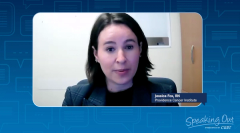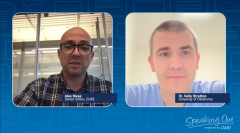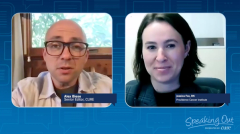
Using Clinical Trials to Advance Prostate Cancer Treatments
One expert explains what patients with prostate cancer interested in clinical trial participation need to know.
Episodes in this series

For patients with prostate cancer who are interested in participating in clinical trials, there are a few things to keep in mind, as one expert explained.
“It's important for patients to know that the majority of our clinical trials that we do are using treatments that we already know work, and we're trying to see if they work earlier or in different spaces,” noted Dr. Kelly Stratton, associate professor of urologic oncology at the University of Oklahoma in Oklahoma City, during a conversation on some of the most promising treatment advancements for prostate cancer that was part of the CURE® “Speaking Out” video series.
“When patients think that they're going to be studied, they're worried that they're going to be given a drug that may not work. And, for the most part, patients are receiving treatments that we have thorough evidence that these drugs are active, we're just trying to find the best possible sequence or best possible order, or how we can use that drug or treatment in addition to surgery or radiation therapy. So [we are] really trying to optimize treatments.”
During the interview, Stratton discussed several recent clinical trials, such as the phase 3 SWOG-S1802 trial. The trial, according to Stratton, “looks at both surgery and radiation in patients who are otherwise getting standard of care [hormone-deprivation therapy], who have metastatic [spread to other parts of the body] prostate cancer, to really delineate the potential benefits of treating the prostate and preventing additional spread throughout patients' treatment. So, this is a very exciting study. There's a lot of centers that are involved. And we're really eager to see this study completed and the results.”
According to its listing on clinicaltrials.gov, with an estimated enrollment of 1,273 patients, SWOG-S1802 is currently recruiting and is estimated to be completed in October 2031.
“If patients are interested in trials, there's usually a center near them where they can reach out and contact a research staff [member] and see if they're eligible,” said Stratton. “When patients are not eligible, that doesn't mean that there's not a good treatment available, it just means that there may be one factor or another that precludes them from being included. And really, our goal as scientists and clinical trialists is to try to find a group of patients that would behave similarly regardless of what the treatment is so that we can determine the potential benefit of doing those treatments. So I think that patients who are interested, if they want to look at look for their local center and reach out to them, they should be able to assist them in determining if they're eligible.”
For more news on cancer updates, research and education, don’t forget to









